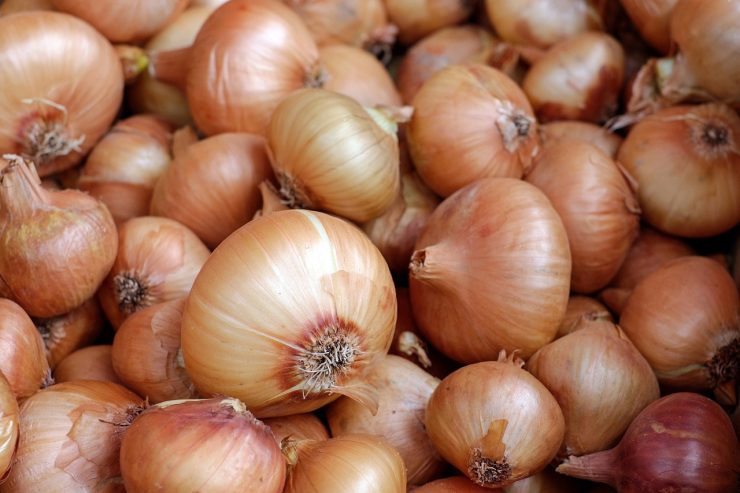The ancient and often underestimated onion has been a dietary staple since prehistoric times, though its strong odor and taste, coupled with the infamous “onion breath,” often lead to its avoidance. However, these very characteristics, attributed to sulfur-containing compounds, are what provide onions with remarkable health benefits.
While onions may not typically enjoy the glamorous status of trendy superfoods, they unquestionably deserve recognition as such.
Forget “an apple a day” – it should be “an onion a day keeps the doctor away!”
Belonging to the same vegetable family as garlic, shallots, leeks, and scallions, onions boast a plethora of essential nutrients, including B vitamins such as B6 and folate, along with significant amounts of vitamin C, manganese, copper, phosphorus, and potassium. Additionally, they’re rich in phytonutrients and antioxidant polyphenols, notably quercetin and allyl disulphide, surpassing even garlic, leeks, tomatoes, carrots, and red bell peppers in polyphenol potency.
These antioxidants imbue onions with natural antihistamine, anti-inflammatory, and antioxidant properties, rendering them effective in preventing or combating various ailments, including diabetes, cancer, cardiovascular disease, and neuro-muscular disorders.
An Anti-inflammatory Agent
Quercetin, a primary polyphenol in onions, acts as a potent anti-inflammatory agent, protecting against heart disease, hypertension, urinary issues, and cancer while also serving as a natural antihistamine. Onions rank among the top ten foods for quercetin content, with superior absorption rates compared to other sources like green tea and apples.
The National Onion Association recognizes onions as significant dietary anti-carcinogens, attributed to compounds like quercetin and sulfur compounds such as diallyl disulfide (DDS), S-allylcysteine (SAC), and S-methylcysteine (SMC). Regular onion consumption, ideally daily servings, has been linked to lower risks of various cancers.
Furthermore, onions contribute to cardiovascular health by preventing blood clots, reducing blood pressure, and lowering triglycerides and LDL cholesterol levels. Their anti-inflammatory properties aid in conditions like asthma, arthritis, Alzheimer’s, and autoimmune diseases.
Onions’ benefits extend to bone density, connective tissue strength, gut health, and diabetes management. Studies indicate their positive impact on post-menopausal women’s bone density and their ability to support connective tissue and promote healthy gut bacteria due to their prebiotic fiber content.
Moreover, onions contain folate, which may alleviate depression by reducing inflammatory agents in the body. They’ve also been used traditionally to treat colds, flu, bronchitis, and respiratory infections.
Choose Wisely
Choosing onions wisely is crucial, as different varieties offer varying nutrient levels. Opt for organic onions to retain optimal nutrient content, and utilize the outer layers, which contain the highest concentration of antioxidants.
Onions, often overlooked in the realm of superfoods, possess a myriad of health benefits, making them a worthy addition to daily meals. Embrace onions’ versatility in cooking, from breakfast scrambled eggs to dinner sautés, and reap the rewards of this humble yet powerful vegetable – just don’t forget to enjoy them with friends to mask the onion breath!
How to Entirely Empty Your Bowels Every Morning – Top Surgeon Explains How
We’ve been told our whole lives to eat certain fruits, vegetables, and whole grains to stay in good health.
However, according to Dr. Steven Gundry — a world-renowned heart surgeon — many so-called “health foods” in the American diet contain a dangerous toxin that could be expanding your waistline.
“This toxin causes micro-tears to form in your fragile intestinal-wall — allowing bacteria and waste products to seep into your body.” Says Dr. Gundry.
This harmful condition is best known as “leaky gut,” and it’s affecting millions of people nationwide. Warning signs include weight gain, fatigue, digestive discomfort, stiff, achy joints, and even skin problems.
Dr. Gundry explains, “These side effects are often mistaken for normal signs of aging, because leaky gut usually develops over a matter of years, and sometimes even decades. But I can assure you, the damage caused by these so-called “health foods” is far from normal.”
The good news is, this problem can be easily fixed from your own home.
“It’s very simple, you just have to know which foods are actually healthy, and which contain this hidden toxin,” he goes on to explain.
By simply eliminating this harmful toxin, Dr. Gundry has seen thousands of his own patients make swift recoveries. (In fact, he even lost 70lbs himself!)
Now, after years of research, Dr. Gundry has decided to release an informative video to the public — free and uninterrupted — showcasing exactly which foods you need to avoid.
“Good health is one of life’s toughest obstacles,” he explains. “So, if this video can help people achieve that, I’ll be thrilled to hear I was of help.”
The video has since gone viral, first being shared by users on Facebook, then being featured on news sites like ABC and CBS.
So far, the comments and feedback have been outstanding, with thousands of Americans feeling better than they have in decades.
Click here to watch the presentation:












